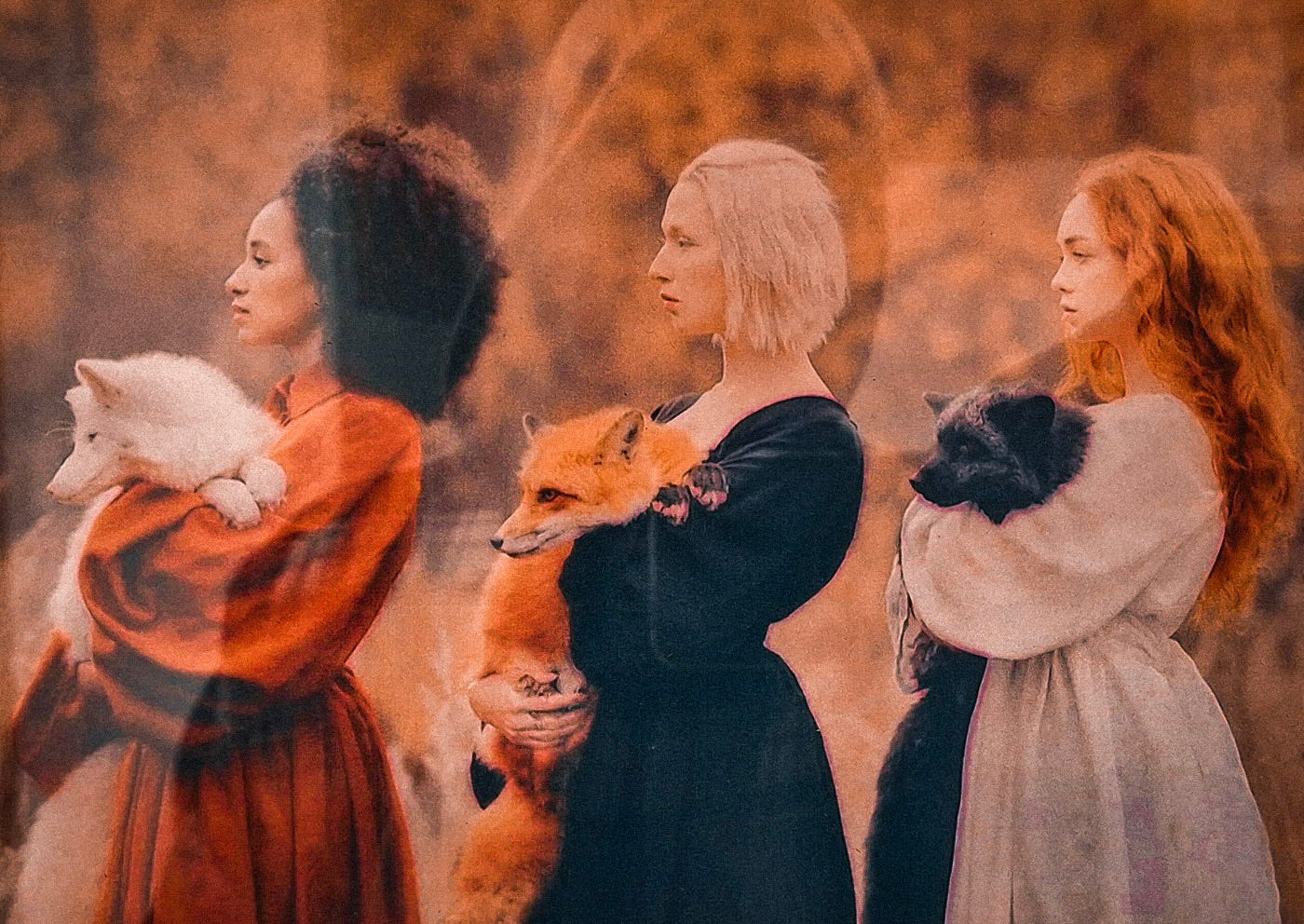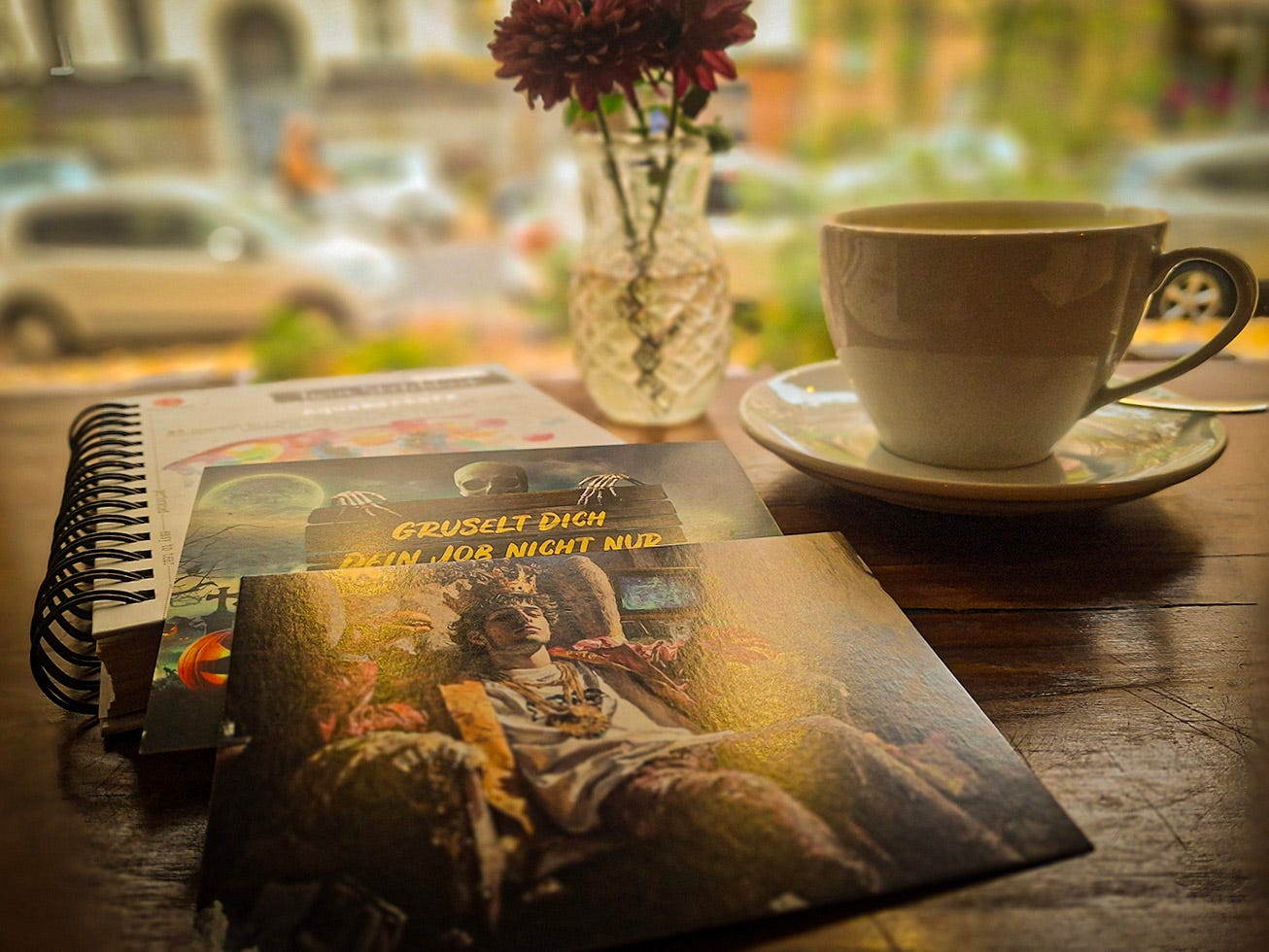fantasy as cognitive necessity
The conceit of the genre is its ability to camouflage and yet disclose.
“The latest incarnation of Oedipus, the continued romance of Beauty and the Beast, stand this afternoon on the corner of Forty-second Street and Fifth Avenue, waiting for the traffic light to change.”1
I’m writing this in the main branch of the Dallas Public Library. The last time I was here I was probably in my late teens, so more than a decade ago. Little’s been done to give this place a facelift. Fewer people mill around on the plaza outside, but that’s likely because of the 99-degree Texas heat. Inside, to my fresh-from-Europe eyes, the carpet looks like it’s from the eighties.2 The wall display in the adult science fiction section—a cut-out of fantasy novel covers (Tolkien, Paolini, and Martin among them) pieced together to form a dragon—looks like it was made by middle schoolers running Windows 98 on their Dell Pentium desktops.
I’ve been in nicer-looking places.
But when I was fourteen, this library was a celestial palace, a sweeping gateway to fantastic realms. This is where I surrendered to Aslan and journeyed with Bilbo Baggins—where I crossed the Bridge to Terabithia and blasted off to Malacandra and Perelandra—where I first read Garth Nix and Neil Gaiman and Lewis Carroll. From where I sit now, I stare at the spines of Angelology, Beren and Luthien, and various Star Wars novels. I know, deep within me, that without the forms and functions of fantasy, I would not have learned the strength to rise from dysfunction.
So, it’s curious that some folks’ pastime appears to be discrediting the fantasy genre and the people who enjoy it. One wonders why. Why, to some critics, is fantasy seen as “training wheels”? Why are otherwise intelligent individuals derided for their love of Tolkien and other “unrealistic” storymakers? Sure, the latest hubbub of ‘people who like fantasy are weird’ is obviously silly and has most certainly blown over except in corners of vested interest (like this one).
Certainly, people obsess over other genres of literature just as much, but I doubt the changed-life narrative that exists around fantasy exists around other literary genres. (Admittedly, I am not on the lookout for such narratives around romance or historical fiction or crime novels.) Still, there are underlying and persistent threads that keep the fantasy genre open to attempts to discredit its status. I intend to address some of those threads and explain why, far from being a frivolous obsession of people who like to daydream, fantasy (and the fantastical context in general) is a cognitive necessity for human development and for the flourishing of a social imaginary capable of individually and collectively rising beyond seemingly insurmountable challenges.
why this essay?
This piece spawns from discussions in forums on both sides of the pond—discussions sparked by
’s brief commentary on fantasy and fantastical stories in her book, The Evangelical Imagination.3 These forums are full of folks who are thoughtful and intelligent and careful. Folks who love Dr. Prior as I do but find her “not a fan of fantasy” stance a bit odd. In a chapter titled “Rapture,” one I enjoyed immensely and think worth reading, she gives fantasy a fair enough shake—a fair enough shake for someone who doesn’t really like it. She writes:I want to say, on the one hand, that fantasy is kind of like training wheels for a people who have labored too long under an impoverished social imaginary.
That’s a statement I agree with although some might take the descriptor of “training wheels” as demeaning. She goes on to quote Flannery O’Connor (another of my literary loves):
To the hard of hearing you shout, and for the almost-blind you draw large and startling pictures.
If our culture is blind and deaf and fantasy is both the bullhorn and the “large and startling” picture, then I’m on board. But I suspect Dr. Prior feels as though we shouldn’t need fantasy to fulfill this role. She writes:
Scads of grown men these days discuss superheroes and medieval fantasy series the way my grandfather once talked about milking the cows, planting string beans, and keeping the aphids off the tomato plants, and the way my father talks about makes and models of cars (all of which actually exist and affect our everyday lives). It’s a little disorienting, in some respects.
Would it be less disorienting if our social imaginary consisted only of stories about farmers and car guys? Knight-errant was once a career path. Admittedly, the dragons may have been an exaggeration. And the dragons were never really the point anyway…but I’m getting ahead of myself.
Dr. Prior laments being bored with Pride and Prejudice as a child and only being able to see its value when she got older. I argue that fantasy is stronger in this respect, in that both children and adults (trained and untrained in appreciation of literature) can see its value. Room for taste and preference notwithstanding, does that not make fantasy, as a genre, superior?
“It may be harder to see the transcendence in the mundane [of Jane Austen’s stories], but believe me,” Dr. Prior writes, “eternity is in [Elizabeth Bennet’s] scandalously dirty ankles.” That’s fine as far as it goes, but fantastic stories erase the difficulty of seeing transcendence because, in a fantasy story, transcendence is the point. There is nothing to see here, except everything.
Despite my contention with Dr. Prior’s general attitude toward fantasy—and she does appear frustrated at the amount of credence given to fantastic arts—she gets some things perfectly right.
Today’s fantasy (not only literature but films, games, cosplay, and even the growing popularity of Halloween celebrations) reflects an awareness that we live in a disenchanted world, as well as our desire to return to that sense of transcendence in the imminent…
We are a symbol-starved people. We need enchanted worlds to help us see the enchantment in our own… Imagination is an expression of the human desire for meaning beyond the literal surface of our lives.
Dr. Prior seems to think that we’d be better people if we didn’t need fantastic stories to help us see the enchantment in the world around us or in the ordinary stories about “things which actually exist and affect our everyday lives.” But the thing is: we have always needed fantastic tales. Stories of enchantment have always told us how to make our way in the world. Fantasy is a cognitive necessity.
back to training wheels
The negativity inherent in the idea of fantasy as “training wheels” useful for a society not mature enough to handle real literature is something I’d like to turn on its head.4 (As you read, you’ll see I elide the terminology of the fantastic and the mythic. “Fantastic” is, for our purposes, the more modern tag for the mythic.) Yes, fantastic stories are training wheels because the training is necessary—and the younger the trainee the better. But the fantastic framework is not discarded when the trainee matures; it is something he keeps with him and relies on throughout life.
Let’s go back to the ideas that underlie the current hegemony of fantastic literature. As the twentieth-century world was awakening to the horrific evil humans are capable of, three academics were arguing that mankind had lost and desperately needed to regain its mythic sensibilities. These mythic sensibilities were expansive, universal, and something which connected all creation.
Carl Jung, psychiatrist and psychotherapist extraordinaire, posited “the existence of an authentic religious function in the unconscious mind,” a train that runs on the twin tracks of symbol and symbolic narrative. Marek Oziewicz, professor of children’s and young adult literature at the University of Minnesota-Twin Cities (who has written a fascinating paper on the subject), says of Jung’s work:
[the] collective unconscious is his most compelling contribution to the study of myth for a number of reasons. It suggests that “the pre-conditions for myth-formation are present within the structure of the psyche itself” and thus implies a deep psychic unity of all humankind. It accounts for the affective power of myth whose “archetypal situation[s]” make us “suddenly feel an extraordinary sense of release, as though [we were] transported, or caught up by an overwhelming power…”5
The sudden release, the transportation, the overwhelmingness of being caught up in myth reminds me of the sweeping nature of Tolkien’s concept of eucatastrophe. It reminds me of Digory and Polly being caught up in Aslan’s “sweetness and power” which “rolled about them and over them and entered them” and made them feel that “they had never really been happy or wise or good, or even alive and awake, before.” This is what fantastic literature has the power to do, and Jung’s philosophy, which has its detractors, is not the only one to support this idea.
Mircea Eliade, a Romanian religious historian and University of Chicago professor, argued that all myths, even “secular” ones, are religious in nature. In his view, myths are descriptions of the “various and sometimes dramatic breakthroughs of the sacred (or the ‘supernatural’) into the World.”6 His “interpretations of myth consist of identifying and analyzing the deep structures and meanings, often hidden and camouflaged, of the mythic disclosures of the sacred.”7 The conceit of the fantastic or mythic story is its ability to camouflage and yet disclose that which is most sacred and most true about human beings. As functionally religious creatures, our experience of the world gains meaning inasmuch as that experience is tied to our perception of the sacred. Mythic stories are the link between reality and the sacred or supernatural.
Finally, Joseph Campbell, writer and professor of literature (not unlike Dr. Prior) proposed (in synthesis with Jung, Eliade, and another intellectual Northrop Frye) that Western civilization’s neglect of myth had brought the culture to the point of collapse. For Campbell, myth provided “a sense of actual participation in [and] a realization of transcendence, infinity, and abundance.”8 He wrote:
[t]he rise and fall of civilizations in the long, broad course of history can be seen to have been largely the function of the integrity and cogency of their supporting canons of myth.9
In place of cogent canons of myth, the West, according to comparative religion expert Karen Armstrong, began to leave such metanarratives behind and, from the late eighteenth century onward, increasingly embraced stories of rationalism, pragmatism, and scientific thought (i.e., “things which actually exist”). This enabled man to function effectively and efficiently in the modern and post-modern world. But as the twentieth century progressed, the optimization of humankind and the wrenching of our attention away from transcendence and the supernatural became a project with ever so obviously failing outcomes.10
the offer of fantasy

What can be said for a world falling on the sword of rationalism and reductionism? What can be said for a people without foundational, transcendent stories?
Let’s take as a given that our collective sociocultural tree is dying. You can’t tell just by looking at it, but brighter minds than mine have pointed out its weak spots. Your cause for concern about our culture might be different from mine, but let’s pretend that we can sum things up with the idea that: collectively, our culture is listless and struggling to find persistent, overarching meaning, purpose, and reason for being.
Whatever else our enlightened minds might hold against ancient, unenlightened cultures, we can’t say our distant forebears didn’t have collective senses of lasting, overarching, and generational meaning. Sure, some of it might have been wrapped up in human sacrifice and bloodletting as a gift to the gods, but one culture’s appalling behavior is another culture’s pathway to heaven. The ancient man had a sense of being in the world, a sense of connectivity, purpose, and meaning. That sense was borne out and communicated in the myths of his people, myths which gave strength, cohesiveness, and capability.
Those myths were, by nature, fantastical. They were man struggling to make sense of a seemingly enchanted world, struggling to reconcile his rudimentary impulses of spiritualism and transcendence with the brutalism and terminality of his day-to-day life. Central to these myths is the cycle of birth, death, and rebirth, which the ancient man saw all around him. So deeply were these myths embedded in the human psyche that they can be considered next to dreams.
My argument is that deeply embedded myths, passed from generation to generation, patterned the minds of our forebears and their children in such a way that it enabled them to persist and overcome nature’s brutalism and terminality.
My further argument is that this particular breed of story—this natural embrace of what we call the fantastic—gives mankind connectivity and purpose and prepares the soul to transcend the brutalism and terminality of our time—at least imaginatively—and deposits in the mind the essential idea of rebirth.
Within the soul, within the body social, there must be—if we are to experience long survival—a continuous “recurrence of birth” to nullify the unremitting recurrences of death… [T]here is nothing we can do, except be crucified—and resurrected; dismembered totally, and then reborn.11
The fantastic story, the mythic dream, provides the idea of the “recurrence of birth,” the path that, for us, leads closest to utopia. This idea is essential to a mindset that says: though the dragon has scorched the valley and demanded a virgin sacrifice, it can still be slain and the next best thing to happiness obtained.
Swap out the dragon-scorched valley for any personal or corporate challenge, from monsters under the bed or a stock market crash to abusive parents or social injustice. The lesson of the ancient, mythic, fantastical stories which tell us that both Grendel and Grendel’s mother can be defeated is best delivered during the time of cognitive development. Dragons, monsters, and gods are not literally essential to this lesson, but it is their perceived unreality that allows the essential lesson to pass through and embed itself in the psyche to be accessed later. Thus, the fantastic is a cognitive necessity for the empowerment of the human and the bettering of society.
The fantastic is not only a projection of fantasy/imagination but also of rational critical consciousness... [F]antasy negates what is corporeally experienced and sublimates what must be carried on as a necessary ingredient in the formation of a transformed condition with Utopian potential.
…Utopia cannot be defined, but it is constituted by fantastic elements in life and art that embody the daydreams of a better life… A better life can only distinguish itself from what it negates in its differential freedom that is provided by the fantastic. It is through difference that the fantastic provides resistance and illuminates a way forward. It shows what is missing in our lives and refuses to compensate for the lack by proposing solutions and providing categories through which we can define people and situations…12
This is the power of the fantastic: to propose solutions, to provide categories, to shed light on a way forward, and to embody the daydreams of a better life. The imagination formed by this is better equipped to handle not only the detritus of daily life but also to overcome the great and persistent difficulties of the human condition.
Fantastic stories are training wheels, and that’s okay. Those training wheels are a cognitive necessity. The still-forming mind must cut its teeth on the benchmarks of the hero’s journey—the quest, the small-death of trials, the challenge of the monster, the humbling, the change, the return or rebirth. The children who grow up to be farmers and car guys and professionals still need what the fantastic has to offer.
Joseph Campbell, The Hero with a Thousand Faces, 1949.
I checked. The library was actually built in the eighties.
Which I’ve read and recommended.
The idea directly contradicts Lewis’ writing on the role of fantasy in an environment when “realistic” fiction was seen as higher and more important. See his Experiment in Criticism: “[F]antasy is precisely the kind of Literature which never deceives at all. Children are not deceived by fairy-tales; they are often and gravely deceived by school-stories. Adults are not deceived by science-fiction; they can be deceived by the stories in the women’s magazines. None of us are deceived by the Odyssey, the Kalevala, Beowulf, or Malory. The real danger lurks in sober-faced novels where all appears to be very probable, but all is in fact contrived to put across some social or ethical or religious or anti-religious ‘comment on life’…”
Marek Oziewicz, “Joseph Campbell’s ‘New Mythology’ and the Rise of Mythopoeic Fantasy,” The AnaChronisT, Vol. 13, 2008.
Mircea Eliade, Myth and Reality, 1963.
Douglas Allen, Myth and Religion in Mircea Eliade, 2002.
Joseph Campbell, The Inner Reaches of Outer Space: Metaphor as Myth and as Religion, 1986.
Joseph Campbell, The Masks of God: Creative Mythology, 1968.
I want to go on such a big tangent right now, but I’m trying to keep this short. Read Armstong’s Battle for God.
Joseph Campbell, The Hero with a Thousand Faces, 1949.
Jack Zipes, “Why Fantasy Matters Too Much,” The Journal of Aesthetic Education, Vol. 43, No. 2, 2009.







